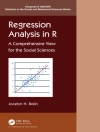Global Modernities is a sustained commentary on the international character of the most microcosmic practices. It demonstrates how the global increasingly informs the regional, so deconstructing ideas like the `nation state′ and `national sovereignty′. The spatialization of social theory, hybridization and bio-politics are among the critical issues discussed.
Jadual kandungan
Globalization, Modernity and the Spatialization of Social Theory – Mike Featherstone and Scott Lash
An Introduction
Glocalization – Roland Robertson
Time-Space and Homogeneity-Heterogeneity
Globalization as Hybridization – Jan Nederveen Pieterse
Global System, Globalization and the Parameters of Modernity – Jonathan Friedman
New World Order or Neo-World Orders – Timothy W Luke
Power, Politics and Ideology in Informationalizing Glocalities
The Times and Spaces of Modernity (or Who Needs Postmodernism?) – Anthony D King
Routes to/through Modernity – G[um]oran Therborn
Searching for a Centre that Holds – Zygmunt Bauman
Security, Philosophy and Politics – Michael Dillon
Normality – Exception – Counter-knowledge – Benno Wagner
On the History of a Modern Fascination
Time, Space, Memory with Reference to Bachelard – Ann Game
The Soviet Individual – Oleg Kharkhordin
Genealogy of a Dissimulating Animal
Bio-politics and the Spectre of Incest – Vikki Bell
Sexuality and/in the Family
The Birth of Identity Politics in the 1960s – Eli Zaretsky
Psychoanalysis and the Public/Private Division
The Modern Error – Eugene Halton
Or, the Unbearable Enlightenment of Being
Mengenai Pengarang
Roland Robertson is Professor of Sociology at the University of Pittsburgh. His books include International Systems and the Modernization of Societies (with J P Nettl, 1968) The Sociological Interpretation of Religion (1970) Meaning and Change: Explorations in the Cultural Sociology of Modern Societies (1978), Religion and Global Order (co-edited with William R Garrett, 1991) and Talcott Parsons: Theorist of Modernity (co-edited with Bryan S Turner












